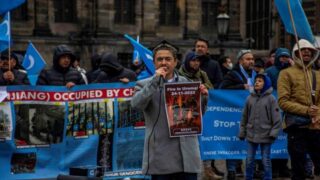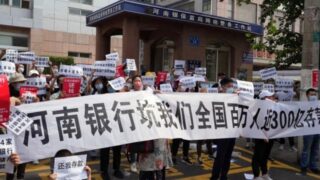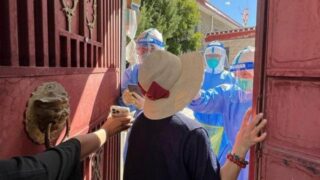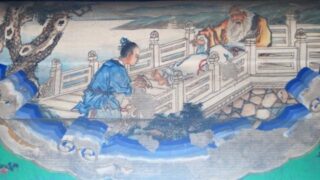China’s religious groups are happy to help when disasters strike. But much of their efforts, and collected donations, are exploited by the government.


by Jiang Tao
According to reports in China’s state-run media, as of February 7, the country’s five authorized religious organizations had collected 300 million RMB (about $ 43 million) to help deal with the coronavirus outbreak. In the face of disaster, China’s religious believers are eager to assist, but not all their efforts are welcome. The New York Times reported in a February 23 article that when some places of worship, not recognized by the state, sent in the money collected by congregations to aid those suffering from the virus, their contributions were rejected, the police even questioned some church leaders.
The Times quotes Susan McCarthy, a political scientist studying faith-based charities in China at Providence College in the US, who thinks that “The government is happy if religious groups make contributions but is wary that they will use charity to expand their base and infiltrate society.” For state-approved places of worship, Ms. McCarthy believes, such donations can also help prove their patriotism and loyalty to the state, and that “a lot of this is defensive.”
Numerous reports received by Bitter Winter support these statements. Moreover, the attitude of believers considerably changes when the money they collect for charity is spent on dubious causes and misused by the government.
Last August, the United Front Work Department in the Zhen’an district of Dandong, a prefecture-level city in the northeastern province of Liaoning, issued a document requiring the five officially-sanctioned religious organizations to launch a charity donation campaign. A month later, the Department counted the donations and criticized those religious groups that have collected the smallest amounts.
“I don’t know why I have to donate. Who am I donating for?” a Three-Self church member from Dandong complained.
“Officials claim that if we don’t make donations, we’re unpatriotic,” said a Three-Self church clergy member, whose church has been criticized for not collecting enough money. “If clerics oppose this policy, they could be deprived of their duties,” he added.
On a wall in a Taoist temple in Ruzhou, a county-level city in the central province of Henan, a variety of medals are displayed. They all have been bestowed to commend the temple’s efforts in charity campaigns to alleviate poverty and help students. A monk in the temple, however, is not proud of these accolades. He explained that the government sets quotas for the local China Taoist Association on how many students they should aid each year. These quotas regularly increase: from 13 students in 2017 to 24 in 2019. The government also requires them to assist the elderly living in villages who have no families.
The Taoists are willing to help, and they do what they can, the monk said. But what the worshipers donate, who are not well off themselves, is not enough to meet the heavy “donation quotas.” While trying to fulfill the government’s demands, the temple has accumulated a debt of 8,000 RMB (about $ 1,150) and cannot afford to pay electricity bills of 200 RMB (about $30) or install the much-needed doors and windows in the canteen.
“We are told that this is a political task, and we must implement it even if it bankrupts us, or we have to stop eating and drinking,” the monk said, clearly distressed. “Moreover, the people who receive our donations don’t know that believers have collected them. They think that the money comes from the government, through officials in the Bureau of Civil Affairs or some other state institution. They only want to prove to the higher-ups how well they work and build their reputation.”
President Xi Jinping promised in 2015 to “lift all impoverished households out of poverty by 2020,” but apparently, the task has been in part shifted onto religious groups.
“Poverty alleviation donation campaigns are organized all over the country,” a temple manager from Pingxiang city in the southeastern province of Jiangxi told Bitter Winter. “When local governments are given tasks to collect money for poverty alleviation programs, they usually approach the state-approved places of worship. Temples in the area, for example, are told to collect money from worshipers and hand it over to the Buddhist Association or the Red Cross.”


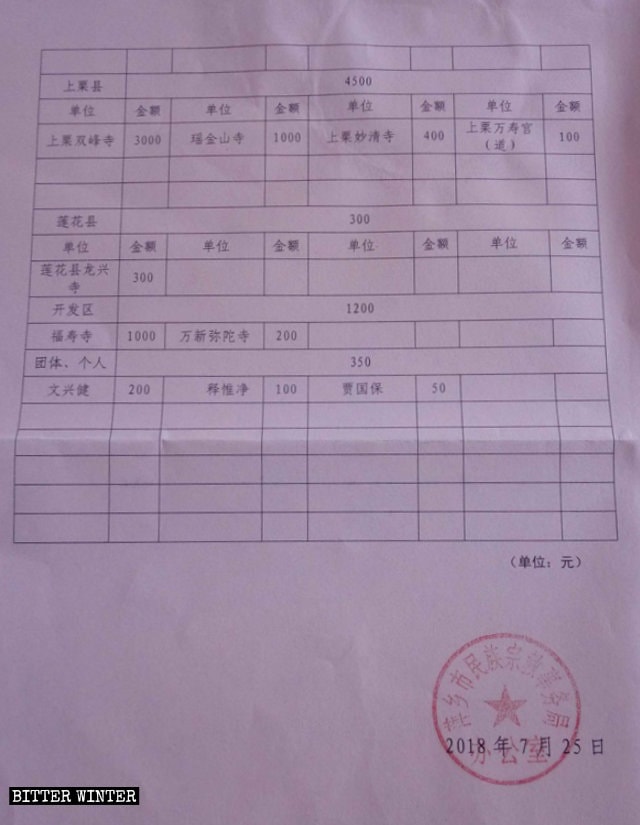

The temple manager added that the local Bureau of Religious Affairs required them to donate money for poverty alleviation every month – 1,000 RMB (about $150) for all impoverished households, plus some oil and rice – or the temple would be suppressed.
According to a monk from a Buddhist Temple in Dezhou city in the eastern province of Shandong, in the fall of 2019, the government informed the impoverished households that they could go to the temple to get flour and oil. “The government wants to look good in the eyes of the people at our expense,” the monk said.
At the same time, the government prohibits the use of “public interest charitable activities for proselytization,” as indicated in the new Regulations on Religious Affairs. That is to say, the CCP doesn’t allow religions to grow by doing charitable work but just wants to take their money. For religious groups that are not officially approved, any charity campaigns may result in arrests of believers or even complete bans.



